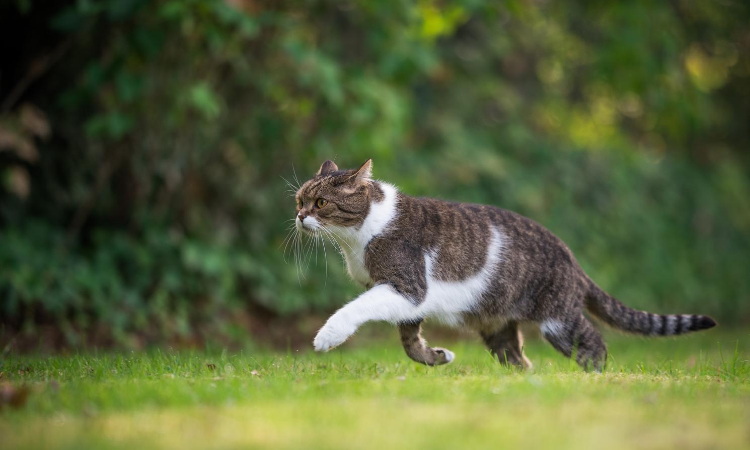With warmer weather usually comes more outdoor time, for you and often your cat. While we all like to enjoy a little fun in the sun, your kitty might have more serious matters they would like to attend to. All cats, even house cats, have the drive to hunt. While for some cats it may be a use it or lose it behavior, for others it stays strong no matter how few opportunities they are presented with. So, since hunting is a natural behavior, cats should be allowed to go nuts, right? Maybe not, before you let your feline friend outdoors to pursue whatever comes naturally, here are a few things to keep in mind about letting house cats hunt.
Consider the Timing
First of all, cats are naturally nocturnal hunters, meaning they prefer to do their dirty work at night. Before you let your cat return to their roots consider what other critters lurk at night – bigger, badder critters that might consider a little feline snack. Owls, coyotes, and bigger cats also choose to hunt at night and what they may be hunting is your cat.
Other dangers include low visibility for cars. It’s hard enough to see a cat on a roadway during the daylight hours, let alone after the sun goes down. Keeping your kitty off the streets at night will greatly help prevent accidents involving vehicles and other animals.
Dangerous Diseases
If your kitty is a successful hunter, they may be in for more than fresh snack. Prey animals, like rodents and birds, can carry many harmful diseases that they can share with your cat, with or without consumption.
- Toxoplasmosis: Cats can contract the parasite Toxoplasma gondii by eating an infected rodent. Often cats will show no symptoms of this parasite, but rather will pass it on to susceptible humans, mainly pregnant women and immunocompromised people, where it does cause problems.
- Other parasites, internal and out: Prey animals can also carry other internal parasites such as roundworms and hookworms. They may also carry ticks and fleas which besides being pests can carry a host of other dangerous diseases.
- The Plague: Rodents can still carry the bacteria responsible for the “black plague”, Yersinia pestis. Infected cats may experience lethargy, fever, vomiting, diarrhea, weakness and muscle soreness. Antibiotics will usually take care of it.
- Rodenticide toxicity: While this isn’t a disease, it’s definitely worth mentioning. Rodents that ingest rodenticides can affect your cats. Rodenticides don’t cause immediate death, meaning a mouse can eat some and go about its day. If a cat later consumes that mouse, they may be affected by the rodenticide as well and experience bleeding that if severe enough can lead to death.
- Rabies: While vaccination has done a pretty good job of keeping the number of rabies infections down in our domestic animals, it is still alive and well in wildlife populations. Allowing your cat roaming and hunting privileges could put them on the trail of a rabid animal that won’t mind sharing this terrible virus. Keeping up to date on rabies vaccinations will definitely help, but since this disease is 100% fatal, it’s best to reduce contact with wildlife all together.
- Others: The list doesn’t end there. Rodents can carry other diseases, like Hantavirus and Leptospirosis, that may not really cause issues in your cat but can be very detrimental to you.
Adding Insult to Injury
If acquiring a disease from their prey isn’t enough to worry about, cats that are allowed to hunt may also be more likely to be injured. Rodents can scratch or bite, possibly leading to serious infections.
If your cat likes to hunt other critters, like snakes, lizards, or birds, they may be in for even injuries. Some snakes provide a bite that can be poisonous and even deadly. When hunting birds, there is always a fall risk as this often takes place in areas above the ground. Depending on where you live, lizards may possess poisons or sharp spines that can all cause damage to your happy hunter.
Even though hunting is instinctual in many of our feline friends, that doesn’t mean it’s a necessary behavior. Whether your kitty is a skilled hunter or a novice, hunting comes with its fair share of dangers, including disease transmission and injuries, that you may decide that you don’t want to put your cat through.









